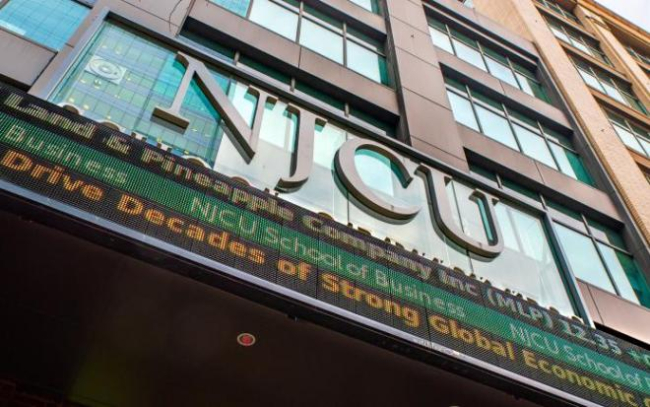You have /5 articles left.
Sign up for a free account or log in.

New Jersey City University
New Jersey City University is facing scrutiny from the state government following a financial collapse that saw a dramatic reversal of fortune with the institution reportedly going from a surplus of $108 million in 2013 to a deficit of $67 million amid plans to expand NJCU's campus.
Last week Governor Phil Murphy, a Democrat, called for an investigation into the university's finances.
"These figures, if true, are deeply troubling, and require an immediate, independent investigation to understand how the financial situation deteriorated so rapidly over an eight-year period," Murphy wrote in a letter to the state's comptroller formally requesting an investigation.
Now it appears that state authorities are poised to open such an investigation.
"We'll look into what has happened at NJCU and follow the facts where they lead us," the acting state comptroller, Kevin Walsh, wrote in part of an email to Inside Higher Ed. "If anyone has information related to this matter, please reach out to us through our website."
The NJCU Board of Trustees acknowledged the request in a statement by Board Chair Joseph F. Scott, who said "we welcome any additional review of the university's financial situation as we work collaboratively with our partners in government, labor and our student, faculty and staff community to move our institution onto solid ground and set it on a path to future sustainability."
The Board of Trustees did not reply to a request for comment. But NJCU officials have pushed back on the criticism -- and reporting -- arguing that critics misunderstand the financial position of the university, that journalists have overstated the reported surplus, and that enrollment issues and changes to national accounting standards are the real cause of NJCU's financial woes.
Now NJCU, a minority-serving institution which enrolls around 6,000 students, many low income and first-generation, is in the crosshairs of state investigators as the fall semester nears.
The Financial Collapse
According to faculty members and local media, NJCU went from a surplus to a major deficit within the span of less than a decade under the leadership of former president Sue Henderson, who resigned last month, earning a potential payout of $1 million amid a financial emergency, which has the Board of Trustees seeking a $10 million lifeline to keep the university afloat. (NJCU has disputed that Henderson will be awarded the full payout.)
Faculty members have pointed to a number of alleged financial missteps by Henderson, largely related to ambitious expansion projects that have drained university coffers and failed to pay off.
Under her leadership, NJCU built a new business school, extended its campus to nearby Fort Monmouth -- which one state official is now urging NJCU to surrender to another college -- and aimed to expand the campus by building a new performing arts center and luxury apartments.
Prior to Henderson's departure, employees noted -- in a University Senate resolution critical of her leadership -- numerous other factors, such as "changes in state contribution to the university budget; changes in student enrollment and retention; adjustments to guarantee pensions, and other reasons."
Enrollment and retention challenges have weakened NJCU finances, Francis Moran, a political science professor and president of NJCU's University Senate told Inside Higher Ed via email. According to university figures, NJCU fell from enrollment of 7,951 total students in fall 2019 to 5,841 students this fall, though officials note those numbers will likely increase before the semester begins.
"I think the main problem was that we're a tuition driven institution, and we hit a bad cycle of declining enrollment just when we embarked on some ambitious expansion plans," Moran wrote. "COVID didn't help any (aside from the lifeline that federal funding provided in the short term; it killed the enrollment from our feeder community colleges). Our retention rates have also not been that solid and we were on this treadmill of constantly finding new students to fill the seats."
University leaders argue that a number of factors, not poor leadership, have drained its finances. An NJCU spokesperson points to declining state contributions -- falling from $26.1 million in 2015 to $21.5 million in 2020, with fluctuations along the way -- and an enrollment drop of more than 2,000 students during the COVID-19 pandemic, which it still has not recovered from. But the main cause of NJCU's financial woes, officials claim, is a change in accounting standards.
A statement provided by NJCU from First Tyron Advisors, a financial services firm retained by NJCU, argues that the university never had a surplus but rather that its net position was $108 million positive and that recent reporting has conflated the concepts of surplus and net position.
One key issue, First Tryon Advisors said, is the 2015 adoption of changes issued by the Governmental Accounting Standards Board, an organization that establishes accounting and financial reporting guidelines for state and local governments and entities like public colleges.
"The reference to decline in Net Position is also being discussed without appropriate context, as the [NJ.com] article does not provide commentary on the implementation of GASB 68 a new, pension-related accounting standard that was required, beginning in 2015," part of the NJCU statement reads. "NJCU's Net Position is currently negative ($61M), but only because of GASB 68. NJCU's Net Position would be $84M without the 2015 change in accounting standards."
The statement added that attributing that decline to leadership "is completely inaccurate."
Ben Durant, the recently hired chief financial officer at NJCU, added:" In the year it was implemented, GASB 68 had a $115 million negative impact on NJCU's Net Position. This was a change in reporting requirements not an actual decline in Net Position. In all practical respects, nothing had changed. The accounting rules simply required NJCU to show a liability that they previously were not required to. In the most recent fiscal year, the GASB 68 adjustment had a $145M negative impact on Net Position."
When the GASB guidelines were first issued in 2012, to go into effect for the 2015 fiscal year, then GASB Chairman Robert H. Attmore said the new accounting standards would "provide a more faithful representation" of obligations such as pensions liabilities and expenses. At the time Attmore, now retired, said: "Among other improvements, net pension liabilities will be reported on the balance sheet, providing citizens and other users of these financial reports with a clearer picture of the size and nature of the financial obligations to current and former employees."
What's Next
Caught in a financial emergency, NJCU has adopted a 90-day interim budget from July 1 to September 30. That budget, according to university spokesperson Ira Thor, "provides funding only for those fixed, mandatory or other costs that are necessary to operate the campus, allowing campus leadership time to develop a full, annual budget (to replace the interim budget) that will incorporate a comprehensive rightsizing plan for long-term sustainability."
NJCU is focused on five key areas to reach long-term financial sustainability: enrollment and revenue generation; cost cutting in the short-term, intermediary and long-term; selling large assets; reviewing its academic offerings; and administrative efficiency, Thor said by email.
"Specific strategies in each area are currently being developed by cross-collaborative, critical priority teams," he wrote. "A detailed rightsizing plan will be presented with the annual budget, which will replace the current interim budget and is scheduled for adoption in late September."
Durant said the university has identified $12 million in cuts.
"Some of those reductions (including furloughs, pay cuts, and vacant position freezes), however, are short-term budget reduction measures, enacted to contain costs while we develop a more comprehensive rightsizing plan to align the size of our institution with the current level of our enrollment," Durant said in an NJCU statement. "But rightsizing takes time. It can't be done haphazardly or in a way that visibly erodes the quality of services expected from students. As such, we are requesting an infusion of stabilization funds from the state to give us the runway we need to develop and implement a thorough and comprehensive plan for long-term sustainability."
In the meanwhile, the university will await a decision on its request for a $10 million lifeline.
According to Moran, details on financial viability efforts "have been scant, but the general view is that we're going to get leaner and come back to our core mission of serving our community here. There's also talk of unloading some of the real estate we took on and stopping projects that had been planned. But the bottom line is we need to recruit students and keep them in the seats."
Moran added that the new administration has been more forthcoming with details in recent days.
Where's the Oversight?
Faculty members at NJCU have been sounding the alarm for months. In September they voted no confidence in Henderson, who resigned in June, for poor financial stewardship and a lack of shared governance. At the time they noted that NJCU's financial position has plunged under her leadership. NJCU's Board of Trustees responded to the no confidence vote by affirming its support for Henderson.
While NJCU's Board of Trustees noted in a statement that it "believe[s] deeply in transparency and openness" members have avoided discussing NJCU's financial issues with the press.
But what exactly is the role of trustees in safeguarding a college from financial collapse?
Larry Ladd, a senior consultant at AGB Consulting, noted that while fiscal management isn't the board's responsibility, they are tasked with making sure institutions are financially sustainable.
"They're not responsible for financial management, but they're responsible for making sure that the assets are used appropriately and there's a sustainable financial model in place," Ladd said. "They're responsible for protecting the assets of the institution over time. That doesn't mean that they manage day-to-day -- they hire a president to do that. But they have to ask the questions to give themselves comfort that the institution is being financially responsible in decision making."
Ladd said boards must be willing to understand the risks that go into bold expansion plans, as well as ask about deficits and how those will be brought under control by university officials.








